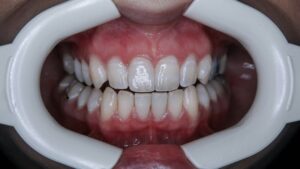Understanding Gingivitis: Your First Warning Sign of Periodontal Disease

Addressing gingivitis is crucial, as it represents an opportunity to prevent future periodontal complications.
Many people dismiss bleeding gums as a normal occurrence during brushing or flossing. However, this common symptom, often accompanied by gum redness and swelling, signals the presence of gingivitis – the earliest stage of periodontal disease.
What Causes Gingivitis?
Gingivitis develops when plaque, a sticky film of bacteria, accumulates along the gumline. This bacterial buildup triggers an inflammatory response in your gum tissue, leading to the classic signs of gingivitis. While highly common, the good news is that gingivitis is completely reversible with proper care and professional intervention.
Risk Factors and Their Impact
Understanding your key risk factors is crucial for preventing gingivitis. Some of the main causes and indicators of gingivitis include:
- Plaque buildup
- Smoking or tobacco use
- Pre-existing health conditions
- Certain medications (may cause dry mouth)
- Genetic predisposition
- Stress & lack of sleep
Warning Signs and Their Significance
Early detection of gingivitis is crucial for preventing more serious periodontal issues. Key warning signs include bleeding or puffy gums during brushing, which indicate active inflammation, along with persistent bad breath from bacterial buildup. Watch for gum recession, sensitivity, and changes in bite patterns, as these may signal more advanced concerns. Other symptoms like altered taste, spongy gum texture, and visible redness are important indicators that should prompt a dental consultation.
Prevention and Treatment Strategies
Preventing and treating gingivitis requires a comprehensive approach to oral care. Thorough brushing twice daily with a soft-bristled toothbrush forms the foundation of good oral hygiene. This should be combined with daily flossing to remove plaque between teeth where your toothbrush can’t reach. Regular professional cleanings and check-ups are essential for removing hardened plaque (calculus) and monitoring gum health.
Maintaining a balanced diet rich in vitamins C and D supports gum health, while staying hydrated helps maintain adequate saliva flow. Using an antimicrobial mouthwash can help reduce bacteria levels between brushing. It’s important to replace your toothbrush every 3-4 months or sooner if bristles become frayed.
If you notice signs of gingivitis, prompt action is crucial for your oral health. At North Carolina Implants & Periodontics, our experienced team specializes in preventing, diagnosing, and treating all stages of periodontal disease using advanced techniques and technology for comprehensive, personalized care. Take control of your gum health today – schedule your comprehensive periodontal evaluation today.
